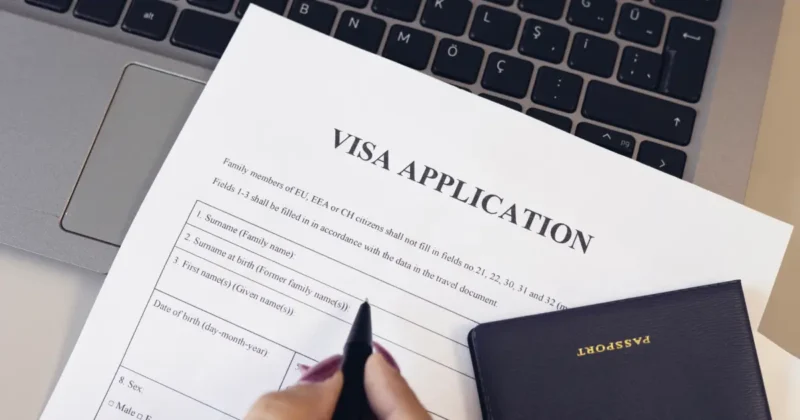Moving to Abu Dhabi with family can be an exciting opportunity. The capital city is known for its thriving expat community. Tax-free salaries are other attractive factors. Abu Dhabi also guarantees a good quality of life. However, before settling down in Abu Dhabi, you will have to go through a series of formalities. It involves intense paperwork and documentation.
Want to learn how to move to Abu Dhabi? Here’s how.

Overview of required documents
Moving abroad requires planning. It is so much more than booking flights and packing your bags (if only it were that easy!). So, you will have to have a few documents to share with the Abu Dhabi authority.

The documents must confirm your:
- Identity
- Financial stability
- Accommodation details
- Other official paperwork
Each document supports a part of the relocation process. From entering the country to enrolling your children in school, knowledge of every step is vital before you plan the move.
If you are moving with your family, you’ll need to compile a few documents. These fall under a few main categories:
- Visa and immigration documents: Entry permits, work visas and applications for residence.
- Proof of identity: Passports, photographs and family certificates.
- Residence and accommodation documents: Tenancy contracts, deeds of property or hotel reservation slips.
- Shipping and customs documents: Bills of lading, packing lists and authorisations.
- Special cases: Family sponsorship, pet importation or diplomatic status.
Key categories of documentation
Visa and immigration documents
Your relocation essentially starts with a visa. Depending on your reason for relocating to the UAE: work, studying, family or business, you will be subject to various permits.

Proof of identity
Authorities will demand proof of identity for you and your dependents. Typically, these include:
- Original, valid passport with a validity of more than six months
- Recent photographs, passport-sized
- Birth and marriage certificates for family members
- Adoption or custody papers, if relevant
- Copies of previous UAE visas, if applicable
Many of these documents require official translations either into Arabic or English. Attestation is commonly required by both the home country and the UAE Ministry of Foreign Affairs.
Residence and accommodation documents
Accommodation proof is an important document for visa applications and residence permits. Depending on your circumstances, this may include:
- Registered UAE tenancy contracts: Tawtheeq in Abu Dhabi
- Property ownership deed, if you have purchased real estate
- Hotel booking for short stays only
- Letter of invitation if you are staying with family, together with proof of relationship
Shipping and customs paperwork

Transporting your belongings to Abu Dhabi requires customs clearance. Some documents you will need to submit are:
- Bill of lading (sea freight) or Airway bill (air cargo)
- Packing list in English describing every item packed
- Copy of passport
- Residence visa copy
- Letter of authorisation for the shipping company
- Insurance documents for the goods shipped
Special circumstances documents
For special circumstances, some documents are required. These include:
- Family: Marriage and birth certificates to confirm relationship.
- Pets: Health certificates from vets, vaccination records, and import permits.
- Diplomatic staff: Diplomatic cards or special authorisations.
- Military service: Documents for exemption or service-related requirements.
- Legal records: Police clearance or court documents for certain visa types.
Visa and immigration requirements
Abu Dhabi offers different types of visas, depending on your needs. Which visa to apply for will depend on your reason for the stay.
General documentation for entry
Such a visa is needed for visitors, tourists, and new residents.
For this, you will need:
- Visa application form duly filled in
- Passport-size photograph matching UAE specifications
- Coloured copy of your passport (valid for at least six months beyond the date of arrival)
- Proof of confirmed travel (either a return ticket or a flight booking)
- Proof of accommodation, either a hotel booking or tenancy agreement
Note: Supporting documents are needed when staying with family. Additionally, the UAE authorities may request more documents based on residency status and nationality.
People from the Gulf Cooperation Council (GCC) countries face fewer formalities. However, others might have to apply in advance. There are a few nationalities that need only a visa on arrival. However, it is best to confirm your eligibility.
Work and residence visa
Most expatriates move to Abu Dhabi for an employment opportunity. So, they need a work visa followed by a residency permit. In this case, the employer is usually your sponsor. So, they will take care of the paperwork for you.
The process usually involves documentation, such as:
- Job offer or employment contract
- Approval of work permit issued by the Ministry of Human Resources and Emiratisation (MOHRE)
- Entry permit for work
- Medical fitness test results
- Application for Emirates ID
- Residence visa stamped on the passport
Government employees get their permits from the General Directorate of Residence and Foreigners Affairs (GDRFA).
Proof of identity and supporting documents
Identity verification is a crucial step in the relocation process.
For this, you need:
- Original passport with at least six months’ validity
- Multiple recent photos with a white background
- Some civil documents, like birth or marriage certificates
- Educational qualifications, if asked for by your employer
- Any previous residency permit, if you have ever lived before in the UAE
Translations and attestations are often necessary. Always keep extra time for this step since attestation might take a few weeks.
Banking and financial requirements
Proof of financial stability is also a mandatory aspect of relocation. Authorities may ask for your:
- Latest bank statement (normally for the past three months)
- Salary slips or proof of income
- Policy details of your health insurance
- Tax or investment documents (if any)
To open a local bank account in Abu Dhabi, you will require your:
- Passport with a residence visa
- Emirates ID (or at least receipt of application)
- Salary certificate or employment contract
- Proof of address (including tenancy contract or utility bill)
Top banks for expats are:
- Emirates NBD
- ADCB
- Mashreq
- HSBC
Shipping and customs documentation
Movement of your belongings to Abu Dhabi is subject to strict customs regulations. The paperwork comprises:
- Bill of lading or air waybill, respectively, to the mode of transport
- Packing list in English without ambiguity for each item
- Passport and a residence visa copy
- Authorisation letter for the shipping company
- Insurance papers for goods shipped
Restricted goods include:
- Medication
- Religious materials
So, avoid shipping these as they may be subject to customs inspection. Further, ensure the packing list is accurate to avoid any issues.
Special circumstances and further documentation
For family members
Family sponsorships need a few extra documents. These include:
- Proof of relationship (attested marriage or birth certificates)
- Sponsor’s residency visa and Emirates ID
- Salary certificate showing sufficient income to sustain dependents
For pets
It is possible to bring your pets to Abu Dhabi. However, for this, you will need:
- Veterinary health certificate issued within a specified timeframe
- Vaccination records, including a rabies certificate
- Import permit from the UAE authorities
- Microchip number to match the one present in the health certificate
For special statuses
- A diplomatic card and customs exemptions may be required for diplomats
- Military service documentation may be requested for certain nationalities
- Court or police records may be requested for background checks, particularly for employment visas
Essential steps and tips
- Start gathering documents at least three months before the planned move
- Make sure that the passport to be used has a minimum validity of six months
- Translate and attest important documents, such as marriage or birth certificates
- Keep several copies of your documents
- Do not book any non-refundable tickets until visa approval
- Consult your country’s embassy about any country-specific requirements
- Check the recent UAE immigration rules, as changes may happen
Key takeaways
- A valid passport with passport-size photos and a visa application form are the basis of your entry process.
- A work and residence visa often involves employer sponsorship, with many complementary actions
- Proof of accommodation is needed for shorter and longer-term stays
- Customs clearance with household goods requires accurate packing lists and shipping papers
- Family movements, pets, and special statuses require extra paperwork. They will also need translation or attestation
- While we have given a detailed guide on how to move to Abu Dhabi, check with your country’s embassy for any country-specific requirements.
FAQs
You need at least six months of validity from the date of your intended arrival.
Most authorities require hard copies. Digital scans serve as a good backup. However, you cannot use them as substitutes.
Yes, you may be required to provide bank statements as evidence of financial stability, especially for self-sponsored or long-term visas.
Yes, it is usually mandatory to provide official translations into English or Arabic. Attestation may also be needed.
Yes. You need a valid health insurance for visa approval and to access healthcare services.
Conclusion
Moving to Abu Dhabi requires paperwork. However, the city’s modern lifestyle and welcoming environment will make everything worthwhile.
We believe, with our detailed guide above, you now have clarity on how to move to Abu Dhabi. However, double-check requirements at your embassy, as rules may change.
Keep your paperwork ready beforehand. It prevents last-minute issues. Always have digital and physical copies. These things will streamline your move to Abu Dhabi.
Planning to relocate soon? Begin your paperwork today so you can focus on enjoying life in Abu Dhabi instead of worrying about missing documents.